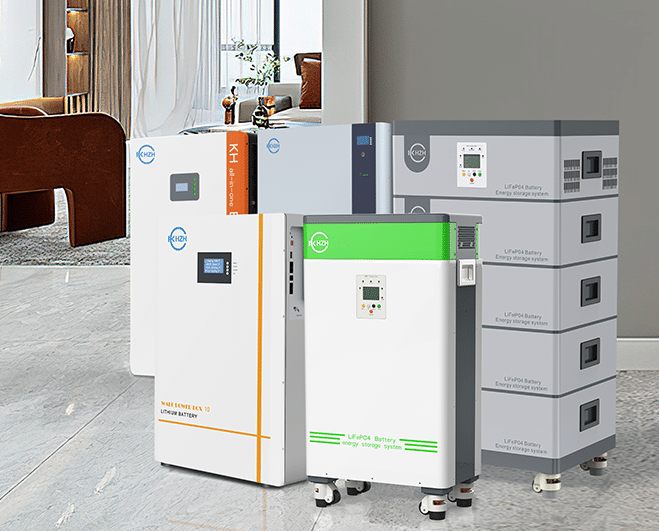LiFePO4 Home Battery Backup Manufacturer
- Custom Lithium Battery Energy Storage Systems | Powerwall Battery | Residential Battery Storage

Home Battery Backup Customized to Your Projects
- KH is the leading home battery backup manufacturer and wholesale supplier in China. We can produce home backup batteries for solar/UPS/Telcom Base Station use high-quality lithium battery cells. No matter if you are looking for LiFePO4 battery backup for home supplier or if you need custom-made LiFePO4 battery, we can all help. Send inquiry to get an instant quote Now!
Home Battery Backup Related Products

204v 20kwh Lifepo4 Battery High Voltage Energy Battery Storage System

48V 400Ah 20Kwh All In One Inverter Lithium Battery Cabinet Syetem

48V 100Ah 5Kwh LiFePO4 Server Rack Battery
Battery Warranty Guarantees Your Benefit
If there is any fault because of battery problem, you can contact us, send us video and picture, our sales engineer will deal with it. When the failure rate is over 3‰, we will send you the new battery for a replacement for free, and we’re responsible for all shipping fees of exchange services.

LiFePO4 Home Battery Backup Application
- KHLitech batteries can power homes during grid outages, at night, or during peak hours to reduce reliance on non-renewable energy sources such as coal-fired power plants.
- Household energy storage
- Photovoltaic energy storage
- Distributed energy storage system
- Home Medical Backup Battery
- Medical Surgical Backup Battery
- Home Ups Battery Backup
Home Battery Backup Manufacturer and Supplier in China

How do we grow your business?
Thinking outside the box to realize the ubiquity of energy storage power! For over 15 years, we have been providing battery solutions to home energy service providers, medical device back-ups, and power in remote areas around the world. Let’s raise your profit to a new level!
ODM/OEM Service
Quickly create custom lithium batteries designed to your needs,support OEM/ODM.
Extream Safety
LiFePo4 lithium is unique chemistry won’t catch fire, overheat, or explode.
15 years warranty
We use top quality battery cells and offer a 15-year warranty on the battery energy storage system.
After Sales and Warranty
Good after-sale service, long product warranty and continual technique support.
FAQs About home battery backup
We will do our best to answer your most frequently asked questions.
How to buy LiFePO4 home battery backup - A complete Buyer's Guide
Table of Contents
1. What is The Home Battery Backup?
A home battery backup is a rechargeable battery that is typically used to store electricity generated from solar panels or other renewable energy sources. The solar battery backup for home-stored electricity can be used for home appliances, like lights, tvs, and air conditioners, or it can be used to power a home during a power outage.
2. Benefits Of Installing Home Battery Backup
- Uninterrupted Power Supply: One of the most important benefits of a home battery backup system is that it provides an uninterrupted power supply, even during power outages. With home battery backup power, you can continue your daily activities without any interruption. This means that you don’t have to worry about losing important work or data during a power outage, and your home’s security system and other critical systems will continue to run without any problems.
- Cost Savings: You can save money on your electricity bill by using stored energy during peak usage times. Many energy providers offer time-of-use pricing plans, which means electricity is more expensive during peak usage times. By using a home solar battery backup to store power during off-peak hours, you can use that stored power during peak hours and save a significant amount of money on your electric bill over time.
- Environmental Benefits: Using energy stored in your home backup battery system can reduce your reliance on the grid and lower your carbon footprint. By storing energy from solar panels or the grid during off-peak hours, you can reduce your overall energy consumption during peak times. Not only does this save you money on your electric bill, but it also helps reduce your overall environmental impact.
- Increased Reliability: Whole home backup battery offer greater reliability and peace of mind, especially for those who live in areas prone to power outages. With a home backup battery, you don’t have to worry about losing power at critical times, such as during a storm or other emergency. In addition, many home battery backup systems come with monitoring systems that can alert you when your batteries are low or need maintenance, ensuring that you always have a reliable backup power source.
- Potential return on investment: Finally, investing in a home battery backup system can increase your home’s value and potential return on investment. Whole home battery backup are becoming more popular as energy costs continue to rise, and having a backup system installed in your home can be an attractive selling point if you decide to sell your home.
3. What Are The Different Types Of Home Battery Backup?
4. How Does Home Battery Storage Work?
5. Where Are Home Battery Backups Used?
6. How To Choose Home Battery Backup?
7. Is Whole House Battery Backup Worth It?
8. How Long Will Whole Home Battery Backup Last?
9. Why Choose Home Battery Backup From Kh Litech?
Request An Instant Quote For Your Projects!
If you have deep cycle lithium battery questions and specific requirements, please contact one of our industry experts. We are happy
to answer any questions you may have!
Send us a message if you have any questionsor request a quote.Our experts will give you areply within 24 hours and help you select the right battery you want.
- +86 0755 21044322
- info@lithiumbatterytech.com

